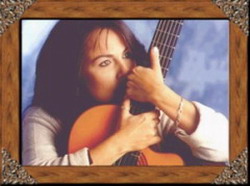Liuba Maria Hevia: from the city asphalt to cuban country music
- Submitted by: admin
- Arts and Culture
- Music
- 07 / 22 / 2007

Liuba María Hevia was born among the noise of the cars and the asphalt smell, in a Havana City neighborhood but, inexplicably, she chose Cuban country, or peasant music to delight her audiences, instead of rock.
For many years, she has been identified as one of those artists who have kept the honor of todays Cuban country music, although she has done it in a modern style to keep out of the classical narrow patterns.
Being over 40, Hevia defines herself as a folklorist, and she rejects being labeled and making use of classic formulas, because she prefers to get the best from as many musical genres as possible in order to produce a more complete and nicer work.
Enjoying a soft and clear voice, Hevia is proud of having collaborated to make the Cuban country music an open style, quite far from a schematic tradition. At the same time her texts have a sort of poetic aura, typical of Cuban troubadours. Just like all her colleagues, sometimes she felt the powerful influence exerted by Silvio Rodríguez and Pablo Milanés, and so, she devoted herself to the beautiful art of mixing melody and poetry.
From the musical point of view, she is wide, diverse. Accompanied by her group she plays either universal classic composers or the most traditional Cuban tunes, like the montuno; then the lute, the 'tres (three-string guitar), the 'claves, and the bongos resound.
Usually she makes it clear that she is fond of the Cuban country music since she was a child. Then, it was an unconscious love. Being an adolescent she kept on thinking the genre symbolized backwardness, an idea encouraged by the schemes spread by Cuban TV.
When she founded her own group, her idea was to play the 'montuno and the 'guajira, but including cello and violin, just like a classic chamber ensemble, together with the 'tres, the lute and an accompanying guitar, typical instruments of the Cuban country music, besides the lesser percussion.
Such format is considered an innovation, because it breaks with any previous idea, offering her wide possibilities to achieve different sonorities, sometimes not heard before.
According to reputed Cuban musicologist María Teresa Linares, Liuba María creates a true style within the Cuban country genre, by placing it before the Baroque, really on vogue among the 1990s composers.
Just as it usually happens with some artists, Hevia is not a singer with large audiences or an idol for the crowds, but a singer-composer for a group of spectators enchanted by her original work. Besides, her admirers have recently increased in number due to her recent work for children, who have responded very well thanks to her delicate and sensitive work, able to perfectly fulfill the childrens special world. Logically, Hevia has made it possible by using her tenderness, a basic tool to win the sympathy of her youngest audience.
For Hevia, one of the most important things for an artist is to know his identity and culture, and embrace both. It is a secret hard to be translated. In her case -she makes it clear- she is honest enough to defend the art she chose, convinced that time will either acquit or condemn her.
Out of stage, Liuba María Hevia always looks calm. She has that natural and uncommon ability to irradiate peace of mind while talking to anyone in the lobby of a recording studio. She defines herself as a nostalgic human being, although she knows how to wipe out any sadness that may cloud her sight. The truth is that she is an optimistic woman hoping that tomorrow will always be a better day.
Source: By Mario Vizcaino Serrat, Cubanow
Comments